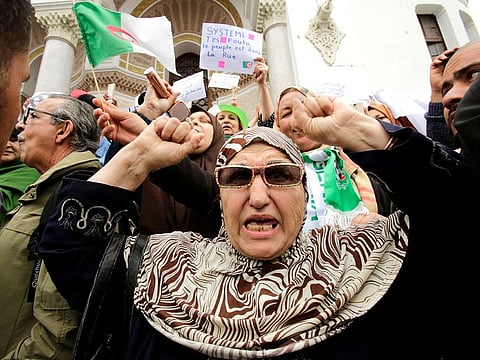Protests grow as Algeria regime cracks emerge
Seven prominent members of ruling party resign

Paris - For a third successive week, tens of thousands of people took to the streets of the capital and cities across Algeria on Friday to protest a fifth term for the country’s gravely ill president, Abdul Aziz Bouteflika, as new cracks opened in the long-standing government.
Many of the protesters on Friday started marching even before the end of weekly prayers, a new development in what has become a wildfire popular revolt organised largely through social media.
The streets of Algiers were so packed with demonstrators that movement inside the crowds was impossible, observers reported. At one point crowds forced through barriers blocking access to the presidential palace, the Mouradia.
The demonstrations were largely nonviolent although there were some clashes between demonstrators and the police, who used tear gas. The police detained 195 people, Algerian state television reported.
“This is a revolutionary situation,” said Lahouari Addi, an Algeria specialist who is emeritus professor at the Institute of Political Studies in Lyon. “The protests are huge. It’s the whole population that wants to see them go.”
As important, ruling party members, top business leaders and even the mouthpiece of the country’s powerful armed forces began siding with the demonstrators.
On Friday seven prominent members of the ruling National Liberation Front party - successor to the liberation movement that freed Algeria from French rule - resigned from the party to express support for the protesters, according to Algerian media.
Earlier in the week, the powerful organisation of former liberation-war combatants, the Moujahidin, saluted the “civilised behaviour” of the anti-government demonstrators and denounced corruption “at the heart of the power hierarchy.” Several chief executives have resigned from the industry bosses’ league in support of the protest as well, although its head remains close to Bouteflika.
Perhaps most significant, Al Djeich, the magazine of the country’s powerful army, published an editorial Friday hinting at support for the mainly youthful protesters.
One of the country’s leading opposition figures, Mohsin Bel Abbas, predicted that the movement would continue. And he suggested that a larger goal had overtaken the original one of Bouteflika’s ouster.
“The people have a determination to fight it out with the system,” said Bel Abbas, head of the Rally for Culture and Democracy party, who joined the protesters in the streets of Algiers on Friday. “There can’t be any turning back.”



